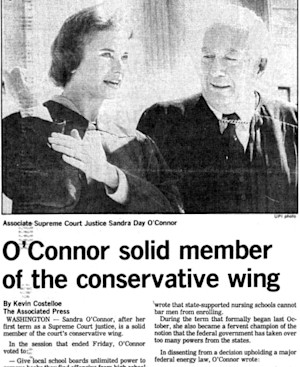O'Connor solid member of the conservative wing
July 4, 1982

DISCLAIMER: This text has been transcribed automatically and may contain substantial inaccuracies due to the limitations of automatic transcription technology. This transcript is intended only to make the content of this document more easily discoverable and searchable. If you would like to quote the exact text of this document in any piece of work or research, please view the original using the link above and gather your quote directly from the source. The Sandra Day O'Connor Institute does not warrant, represent, or guarantee in any way that the text below is accurate.
Transcript
(Automatically generated)
WASHINGTON - Sandra O'Connor, after her
first term as a Supreme Court justice, is a solid
member of the court's conservative wing.
In the session that ended Friday, O'Connor
voted to:
- Give local school boards unlimited power to
remove books they find offensive from high school
and junior high libraries. Her side lost.
- Let Washington state voters bar a school busing plan voluntarily adopted by the city of Seattle
to achieve racial balance. Again, she was on the
losing end.
- Allow states to execute "non-triggerman"
criminals whose crimes resulted in a death even
though they did not intend to take part in a killing.
Another minority view.
O'Connor's overall voting record indicates just
how much she has joined the court's conservative
side since she was sworn in last September.
In the 31 cases decided by 5-4 votes - rulings
that generally indicate the thorniest disputes between liberals and conservatives - O'Connor sided
with ultra-conservative Justice William Rehnquist 27 wnes.
She sided only four times in 5-4 decisions with
Justice William Brennan, leader of the court's
liberals.
Only once were the three justices on the same
side in a 5-4 ruling, a relatively minor case.
In other key cases during the just-completed
term, the 52-year-old O'Connor voted to:
- Bar all lawsuits seeking monetary damages
from U.S. presidents for misconduct in office. Her
side prevailed.
- Deny illegal alien children a free public
school education. A minority view.
- Expand the power of police to search
automobiles without a warrant. Her side won.
The former Arizona appeals court judge thus
showed herself to be far more conservative than
her middle-of-the road predecessor, Justice Potter
Stewart.
In fact, one justice said privately that O'Connor
has moved to the "far right" and that she was
"throwing her weight around" more than most
rookie members of the high court.
O'Connor still has not had to face abortion, the
single most controversial issue that arose. during
her Senate confirmation hearings. Some conservatives claimed she favored abortion during her
days as an Arizona legislator. .
The Supreme Court has agreed to decide a
sweeping set of abortion issues, but a final ruling
is not expected until next year.
In her only signed majority opinion dealing with
th¥ constitutional issue of sex bias, O'Connor
'wrote that state-supported nursing schools cannot
bar men from enrolling.
During the term that formally began last October, she also became a fervent champion of the
notion that the federal government has taken over
too many powers from the states.
In dissenting from a decision upholding a major
federal energy law, O'Connor wrote:
"Each state is sovereign within its own domain,
governing its citizens and providing for their
general welfare. While the Constitution and
federal statutes define the boundaries of that domain, they do not harness state power for national
purposes."
She also authored a majority opinion trimming
back the power of federal courts to override
criminal convictions obtained in state courts in
certain instances.
"Federal intrusions into state criminal trials
frustrate both the states' sovereign power to
punish offenders and their good-faith attempts to
honor constitutional rights," she wrote.
O'Connor also joined Justice Lewis Powell's dissent from a ruling that all boating accidents - including those involving pleasure craft - can be
brought to federal court rather than state courts.
There were some surprises in her voting patterns, too.
In a highly emotional issue, O'Connor said
states cannot automatically bar the press and
public from attending criminal trials when young
victims of sex crimes are testifying.
She also agreed that under existing federal law
victims of alleged civil rights violations do not
have to exhaust all state administrative pr<r
cedures before suing in federal court.
The justices do all their deliberations behind
closed doors, generally with only occasional
flashes of bitter disagreement creeping into their
written opinions.
In O'Connor's case, though, the sophisticated
name-calling was noticeably harsher than usual.
Justice Harry Blackmun wrote that she had attacked his opinion in the federal energy case with
"apocalyptic observations" that were "overstated
and patently inaccurate."
Writing for the majority in an employment
discrimination case, O'Connor accused Blackmun
of hurling an "ad hominem" argument at her in
his dissent. The term "ad hominem" is used to
describe a contention against an opponent rather
than against his or her arguments.
In the case that trimmed some federal court
oversight of state criminal actions, Brennan attacked O'Connor's majority opinion at length. He
said O'Connor had employed "sentiments in
reasons' clothing."
